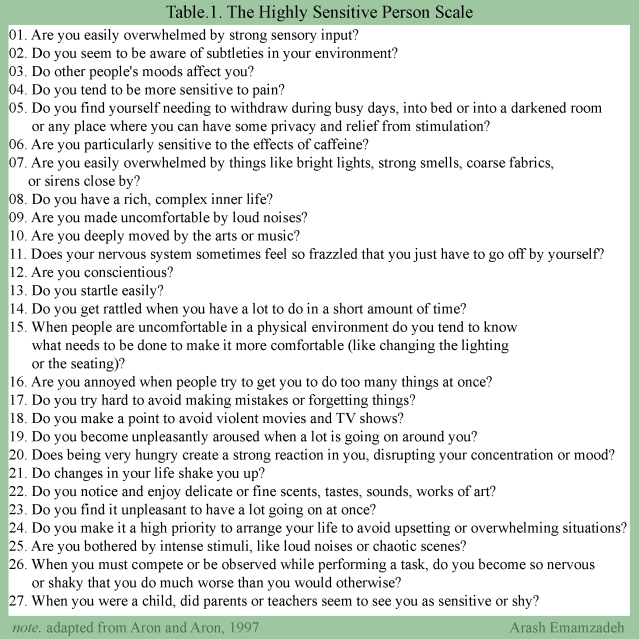HIGHLY SENSITIVE PERSON- New Research on the Emotions of Highly Sensitive People. Increased sensitivity correlates with negative events, a new study finds. Reviewed by Monica Vilhauer

KEY POINTS-
- Sensory processing sensitivity concerns differences in how we perceive and respond to stimuli (e.g., touch).
- Highly sensitive people (HSP) tend to process sensory data deeply and experience strong emotional reactions.
- A key question is whether highly sensitive people show greater responsiveness to certain types of events only.
- Highly sensitive individuals appear to have a more intense reaction to negative but not positive events.
A recent study examined whether highly sensitive people are affected more strongly by negative events only, or by both negative and positive events.
The paper, authored by Van Reyn et al., and published in the August 2023 issue of Social Psychological and Personality Science, is reviewed below.

The highly sensitive person and sensory processing sensitivity
What does it mean to be a highly sensitive person? Sensory processing sensitivity refers to individual differences in the perception of and response to stimuli (e.g., noise, light, touch).
Sensory processing sensitivity is considered a temperament or personality trait with four components:
- Strong emotional reactions.
- Deep processing of sensory data.
- Enhanced awareness of environmental subtleties.
- Great susceptibility to overstimulation.
The Highly Sensitive Person Scale, developed by Aron and Aron, is used to measure individual differences in environmental sensitivity (see Table 1). A high score is associated with greater sensitivity.

An important question is whether highly sensitive people show greater reactivity only to negative stimuli (e.g., an invalidating childhood environment, abusive romantic relationship, hostile workplace) or positive stimuli as well (e.g., a loving family, supportive romantic partner).
Investigating sensory processing sensitivity and positive/negative events.
Sample: 239 Amazon Mechanical Turk (MTurk) workers; 129 males, 108 females, and two non-binary; average age of 37 years old (ranging from 20 to 72 years); 86 percent American.
Participants were asked to complete an initial survey, plus 21 scheduled daily diaries.
Measures
- Highly Sensitive Person Scale: 27 items; for example, “Are you easily overwhelmed by strong sensory input?” and “Do changes in your life shake you up?”
- Daily life satisfaction: One item (“How satisfied were you with your life today?”)
- Daily self-esteem: Degree of agreement with the item, “Today I had high self-esteem.”
- Daily positive and negative affect: Level of agreement with 13 emotion items from the Affect Valuation Index (e.g., angry, enthusiastic, happy, lonely, relaxed).
- Event appraisals: Eight items. For instance, “How threatening was the experience?”
- Event descriptions and intensities: Participants’ descriptions and appraisals of the day’s most positive and negative events.
Sensory processing sensitivity and the influence of negative environments
The present research, the first-ever longitudinal investigation of sensory processing sensitivity, found that increased sensitivity correlates “only with greater emotional reactivity to negative events.”
Specifically, those with high sensory processing sensitivity experienced more negative emotions and lower self-esteem, self-efficacy, and life satisfaction in “response to more subjectively intense negative events.”
They did not experience “greater benefits from more subjectively intense positive events, such as larger increases in positive affect or life satisfaction.”
This agrees with the diathesis-stress model—the theory that mental health problems result from a combination of negative life experiences and environments (stress) and specific biological vulnerabilities (diathesis).
That is why, when compared to another person who grew up in the same stressful and invalidating family context, a sensitive person is more likely to report elevated levels of anxiety and depression.

Summary
Highly sensitive people tend to experience more frequent and intense negative emotions and lower well-being than others.
They report lower self-esteem, reduced life satisfaction, and are at a greater risk of developing mental health problems (e.g., anxiety, depression, post-traumatic stress disorder).
In fact, the majority of psychotherapy clients may have sensory processing sensitivities.
The reviewed study found that highly sensitive persons react strongly to negative events but do not benefit from more positive ones.
Given these findings, a potentially effective treatment for the highly sensitive may be mindfulness meditation and related interventions. Why? Because mindfulness practice may reduce negative emotions while increasing positive emotions.
Mindfulness meditation for the highly sensitive person
Mindfulness means awareness of whatever one experiences. The quality of this awareness is important. It needs to be open, accepting, nonjudgmental, and focused on the here and the now. Potential benefits of mindfulness meditation include:
- Improved motivation.
- Improved memory.
- Higher self-esteem.
- More optimism.
- Greater life satisfaction.
- Questions and Answers
- Opinion
- Motivational and Inspiring Story
- Technology
- True & Inspiring Quotes
- Live and Let live
- Focus
- Geopolitics
- Military-Arms/Equipment
- الحماية
- Economy/Economic
- Art
- Causes
- Crafts
- Dance
- Drinks
- Film/Movie
- Fitness
- Food
- الألعاب
- Gardening
- Health
- الرئيسية
- Literature
- Music
- Networking
- أخرى
- Party
- Religion
- Shopping
- Sports
- Theater
- Health and Wellness
- News
- Culture

